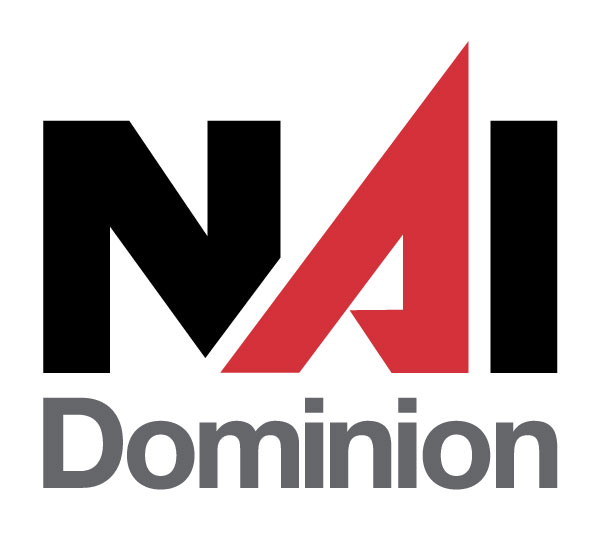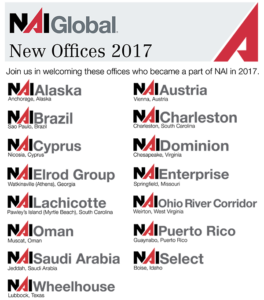Tag Archives: Retail
Newest Member of the NAI Global Team.
Do Designations Matter When Choosing A Commercial Real Estate Broker?
Chad Griffiths, a partner with NAI Commercial Real Estate in Edmonton, Canada, looks at the benefits of obtaining a CCIM or SIOR designation. Many Agents and Brokers in NAI Dominion and our affiliate firms in NAI Global have one or both designations. We would highly recommend working towards obtaining the designation right for you as it will only help you and your clients and customers.
“Commercial real estate transactions are some of the most important deals that a person or business can make. Finding the right commercial real estate can make or break a business venture. That is why people want the best professional commercial real estate broker available to guide them through the process.
But how can you separate the best professional real estate brokers from the rest?
Degrees And Designations
Most other important professions have a degree or designation that any practitioner is required to have by law. Lawyers have the J.D., doctors the M.D., engineers the P.Eng and so on. Yet there are no professional designations that are required to practice as a commercial real estate broker.
Fortunately, commercial real estate broker associations have created professional designations that allow you to identify those practitioners who have gone above and beyond to become masters of their craft. While anyone who has met the necessary licensing requirements for their jurisdiction can become a commercial real estate broker, these professional designations help the best stand out from the rest and give you the peace of mind that you have found someone that you can trust to guide you through these important decisions.
What’s In A Degree Anyway?
A degree or professional designation signifies that the holder has the necessary education and experience to safely practice their profession. These designations are designed by professional associations to represent at least a bare minimum of knowledge and experience that every practitioner needs to do their job effectively and to a minimum standard of performance expected by their professional peers. Anyone who meets these standards can be relied upon to make the right decisions when practicing their craft.
Commercial real estate designations signify knowledge in relevant areas of law and finance, as well as the customs and ethics of the commercial real estate industry. These professional designations also signify a commitment to ongoing education and regular participation in the professional community and industry events.”
Tips When Negotiating Your Commercial Lease
Have an Ally at the Table
A tenant rep is a major asset during lease negotiations. With their knowledge of the market, they know what’s fair and what’s not and can provide valuable input during talks. Best of all, their services won’t cost you a dime, as your landlord pays their fees.
Envision What You Want
You can’t negotiate effectively if you don’t know what you’re fighting for. Before you head into talks, carefully peruse the contract and have key members of your team such as your tenant rep, attorney and accountant do the same. Identify areas of the contract that need to be changed for the document to be acceptable. Then, create a prioritized list of things that you would ideally like to have added, changed or eliminated. Be prepared to give up less important items.
Know What’s Negotiable
Knowing where there is flexibility in contracts can help you create the aforementioned wish list. The following are some of the most common points of negotiation for commercial leases:
- Base rent rates. You can often negotiate a lower rental rate by extending the length of your lease.
- Tenant improvement allowances. Landlords may be willing to spend more on improvements to customize or enhance your space, especially if they will increase the value of their property.
- Rent increase caps. If there is no cap on the amount that your rent can increase at renewal, argue for one. You can also ask to have an existing cap set lower, especially if it is out of line with the average increase rate in your area.
- Right to sublease. Having the ability to lease all or part of your space to another company can help to future-proof your lease.
- Multiplying factor. Ask the landlord to explain how the multiplying factor is calculated. This figure determines how you are charged rent for the shared square footage in the building, and it can often be negotiated.
- Rights of first refusal and first offer. Adding these clauses to your lease ensures that you’ll have a chance to lease any new space in the building that becomes available and that you will have the opportunity to renew your lease before your landlord offers it to a new tenant.
Do Your Homework
Having facts and figures about the commercial real estate market in your area at the ready can give you leverage at the negotiating table. Find out what the average rental rate is for your area and what types of terms similar companies are given. It’s also helpful to know what amenities and perks competitor buildings offer.
Don Catalano of REoptimizer outlined these tips for negotiating a commercial lease.
Why NAI Dominion and NAI Global?
I am often asked why we partnered with NAI Global to expand out brokerage services. The link below helps to outline a few of the reason we partnered with NAI Global to grow our opportunities and success for our clients, customers, and tenants.
Check out the link below and let us know what you think.
The Difference Between Amateurs and Professionals
The Difference Between Amateurs and Professionals
Why is it that some people seem to be hugely successful and do so much, while the vast majority of us struggle to tread water?
The answer is complicated and likely multifaceted.
One aspect is mindset—specifically, the difference between amateurs and professionals.
Most of us are just amateurs.
What’s the difference? Actually, there are many differences:
- Amateurs stop when they achieve something. Professionals understand that the initial achievement is just the beginning.
- Amateurs have a goal. Professionals have a process.
- Amateurs think they are good at everything. Professionals understand their circles of competence.
- Amateurs see feedback and coaching as someone criticizing them as a person. Professionals know they have weak spots and seek out thoughtful criticism.
- Amateurs value isolated performance. Think about the receiver who catches the ball once on a difficult throw. Professionals value consistency. Can I catch the ball in the same situation 9 times out of 10?
- Amateurs give up at the first sign of trouble and assume they’re failures. Professionals see failure as part of the path to growth and mastery.
- Amateurs don’t have any idea what improves the odds of achieving good outcomes. Professionals do.
- Amateurs show up to practice to have fun. Professionals realize that what happens in practice happens in games.
- Amateurs focus on identifying their weaknesses and improving them. Professionals focus on their strengths and on finding people who are strong where they are weak.
- Amateurs think knowledge is power. Professionals pass on wisdom and advice.
- Amateurs focus on being right. Professionals focus on getting the best outcome.
- Amateurs focus on first-level thinking. Professionals focus on second-level thinking.
- Amateurs think good outcomes are the result of their brilliance. Professionals understand when outcomes are the result of luck.
- Amateurs focus on the short term. Professionals focus on the long term.
- Amateurs focus on tearing other people down. Professionals focus on making everyone better.
- Amateurs make decisions in committees so there is no one person responsible if things go wrong. Professionals make decisions as individuals and accept responsibility.
- Amateurs blame others. Professionals accept responsibility.
- Amateurs show up inconsistently. Professionals show up every day.
There are a host of other differences, but they can effectively be boiled down to two things: fear and reality.
Amateurs believe that the world should work the way they want it to. Professionals realize that they have to work with the world as they find it. Amateurs are scared — scared to be vulnerable and honest with themselves. Professionals feel like they are capable of handling almost anything.
Luck aside, which approach do you think is going to yield better results?
Food for Thought:
- In what circumstances do you find yourself behaving like an amateur instead of as a professional?
- What’s holding you back? Are you hanging around people who are amateurs when you should be hanging around professionals?

NAI Eagle is now NAI Dominion
We are very excited to announce that now NAI Eagle and NAI Eagle-Hampton Roads is now NAI Dominion. This change is far more than a name rebranding it is a fundamental advancement in providing commercial real estate services to the existing clients, customers, tenants, landlords, and investors as well as expanding services in the Richmond and Hampton Roads markets.
NAI Dominion is a privately-held commercial real estate firm headquartered in Hampton Roads and Richmond, Virginia, with a global network of more than 7,000 professionals across 55 countries. Our firm serves tenants, landlords and investors in virtually every industry; and our brokers are top producers with the metro Hampton Roads and Richmond area. We are committed to being a leading provider of commercial real estate services in Central and Southeast Virginia and beyond. Our partnership with NAI Global, the largest network of independent commercial real estate firms worldwide, allows us to serve your needs across the globe. Working cooperatively, NAI offices complete over $20 billion in combined transactions annually and manage 425 million square feet of commercial space. Our clients range from Fortune 500 companies, banks and investors to private institutions and small businesses.








